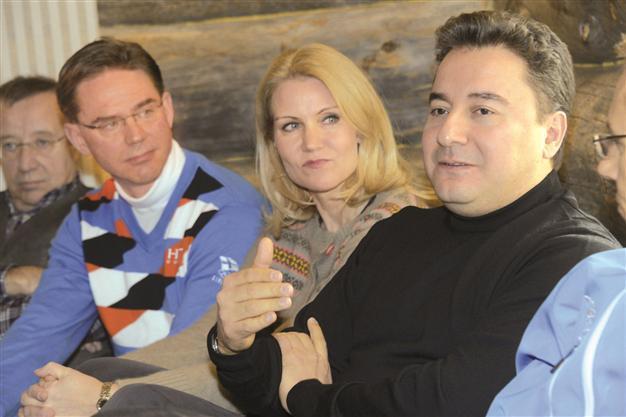Turkey warns bailed-out Greek Cyprus over Mediterranean
SAARISELKA, Finland / MOSCOW

Turkey’s Deputy Prime Minister Ali Babacan speaks during a news conference after the EU’s policy makers’ informal meeting in the small town of Saariselka, in the Lapland region of Finland. REUTERS Photo
Turkey does not approve of the European Union’s bailout solution for Greek Cyprus, Turkish Deputy Prime Minister Ali Babacan has said, also finding unacceptable a loan method that provides natural resources in the Eastern Mediterranean as a guarantee.
“The method applied in Greek Cyprus may be necessary for the country. But I say it is not right on principle,” Babacan was quoted as saying by Anatolia news agency yesterday.
Babacan noted the uniqueness of the method, which imposes a tax on deposits in Greek Cypriot banks, during the informal meeting of the EU to discuss the future of the union in the small town of Saariselka, in the Lapland region of Finland last weekend. He stressed that it should not represent an example for other eurozone members in crisis.Babacan also criticized Greek Cyprus’ banks that had accepted inappropriate deposits by offering them a higher interest rate than market average. He said Greek Cyprus tried to pay their debt with debt.
Greek Cyprus and the EU sealed a bailout deal early yesterday. Under the terms of the agreement, the island’s second-largest lender Laiki (Popular Bank) will close while the Bank of Cyprus, the island’s largest lender, will have to endure a major “haircut” on all deposits of more than 100,000 euros.
‘Plan should not apply to other countries’Babacan underlined that “reliance” was the key element of the banking sector. He said this plan should not apply to other countries’ bailouts, adding that they should not allow the Greek Cypriot example to cause a general unreliability in the banking system in Europe and the EU.
However, Babacan, who criticized the EU bailout plan that imposes a cut on deposits, also said Greek Cyprus could not provide natural resources in the East Mediterranean as a guarantee in any loan method.
“The resources around the island do not belong only to Greek Cypriots. They belong to all people that live on the island in the framework of international law.
The Turkish Foreign Ministry warned that the Greek Cypriot plan would risk a fresh crisis in the region, saying such a move would ignore Turkish Cypriots’ equal rights to the hydrocarbon resources of the island, in a statement on March 23.
“Possible plans to put the island’s joint resources up as collateral for a ‘solidarity fund’ or any other loan agreement is just another reflection of the Greek Cypriot illusion that it is the sole owner of the entire island and it risks a fresh crisis in the region,” the statement said.
The statement also said Turkey would continue to protect the country and Turkish Cypriots’ interests and rights in the Mediterranean and based on this understanding, Turkey and Turkish Cypriots were ready to work with Greece and Greek Cypriots. “The only way to exploit the natural resources flows through an agreement under the auspices of the U.N. secretary-general and by getting the consent of the Turkish Cypriot side,” it said.
